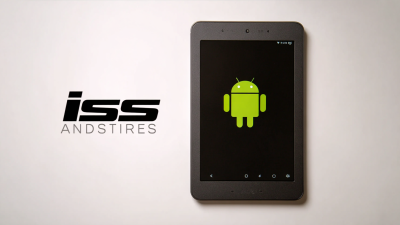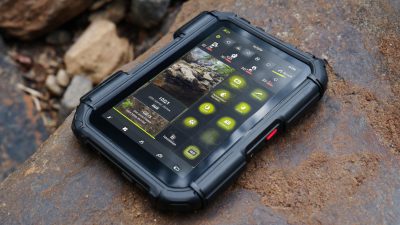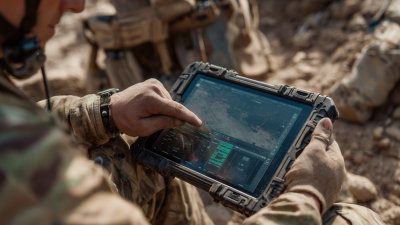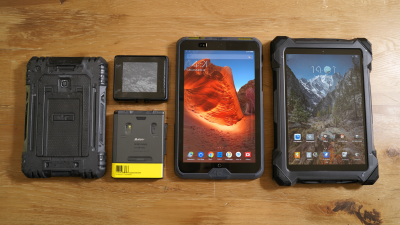Top 5 Mdt Terminal Android Solutions for Streamlined Healthcare Operations
In the fast-evolving landscape of healthcare, the integration of technology has become paramount for enhancing operational efficiencies and improving patient outcomes. According to a recent report by Grand View Research, the global healthcare IT market is expected to reach USD 390.7 billion by 2024, with increasing investments in mobile solutions playing a critical role in this growth. Among these innovations, the Mdt Terminal Android systems have emerged as a cornerstone for healthcare professionals seeking streamlined workflows and real-time data accessibility.
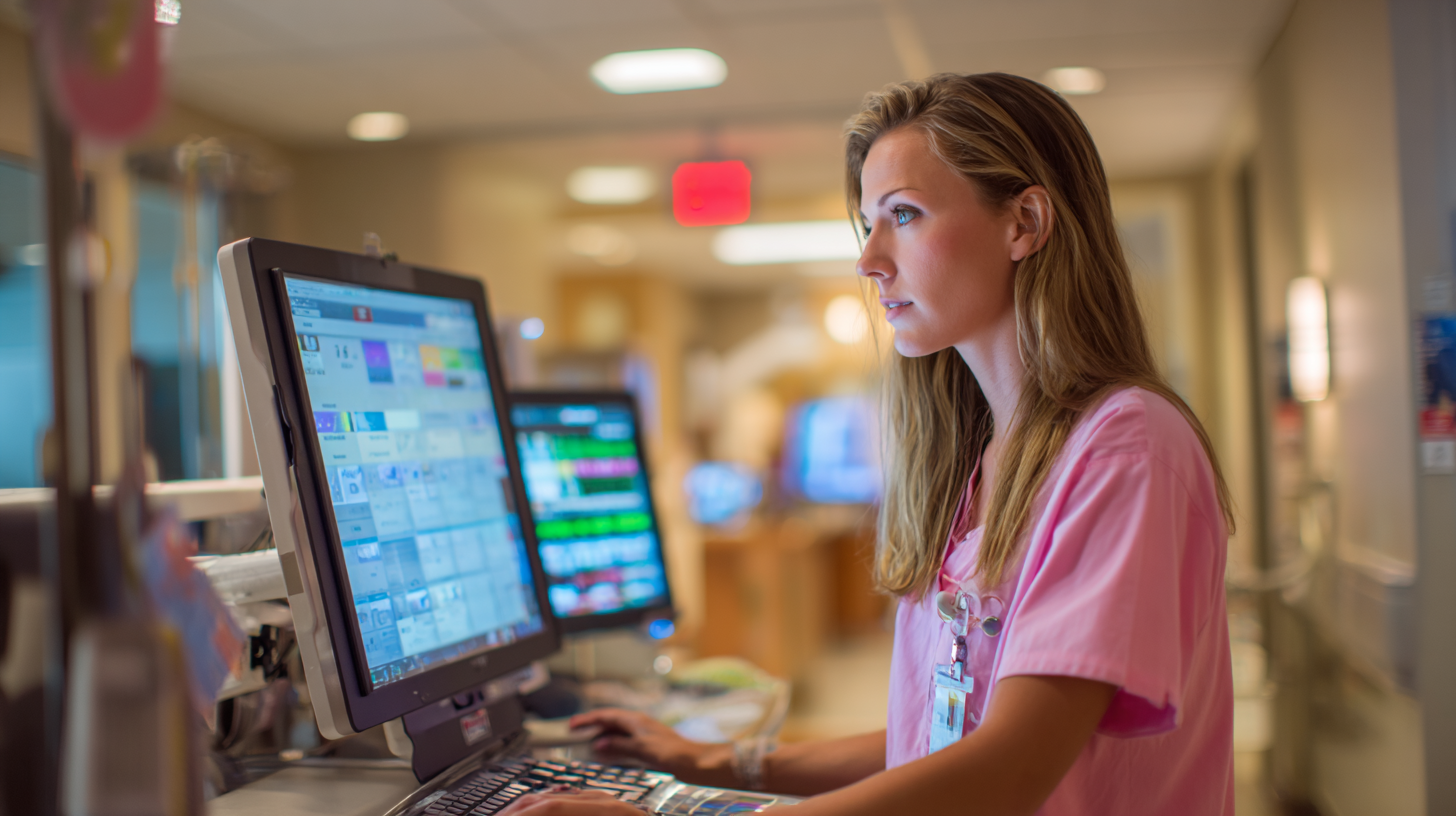
Mdt Terminal Android solutions not only facilitate seamless communication among healthcare providers but also enhance patient engagement through intuitive interfaces. A study conducted by the Healthcare Information and Management Systems Society (HIMSS) revealed that 88% of healthcare professionals believe that mobile technology significantly impacts patient care delivery. By integrating Mdt Terminal Android systems into their operations, healthcare institutions can reduce administrative burdens, allowing staff to focus more on delivering quality care rather than managing cumbersome processes.
As we look towards 2025, the adoption of these advanced Mdt Terminal Android solutions is set to revolutionize healthcare operations. This article will explore the top five solutions that are poised to transform the industry, highlighting their functionalities and the measurable benefits they offer to healthcare organizations striving for excellence in service delivery.
Benefits of Implementing MDT Terminals in Healthcare Settings for Enhanced Patient Care
The implementation of MDT (Mobile Data Terminal) terminals in healthcare settings is transforming how patient care is delivered. By providing healthcare professionals with real-time access to patient data and clinical applications, MDT terminals enhance decision-making processes. This immediacy of information allows for quicker response times, ensuring that patients receive timely and appropriate care. With less administrative burden, clinicians can focus more on direct patient interaction, which is essential for improving patient outcomes.
Moreover, MDT terminals facilitate seamless communication among healthcare teams. This interoperability allows for coordinated care, notably in environments where multiple specialists are involved in a patient's treatment. Enhanced collaboration not only streamlines operations but also minimizes the chances of errors, thereby boosting patient safety. As healthcare systems continue to evolve, the integration of MDT terminals not only supports enhanced workflow efficiency but ultimately leads to a higher standard of patient care.
Statistics on Increase in Efficiency and Cost Reduction with MDT Android Solutions in Hospitals
The integration of MDT (Mobile Data Terminal) Android solutions in hospitals has led to remarkable improvements in efficiency and substantial cost savings. Statistics indicate that healthcare facilities adopting these technologies have experienced a 20% reduction in administrative workload, enabling staff to focus more on patient care rather than paperwork. Furthermore, hospitals have reported up to a 30% decrease in operational costs due to streamlined processes and reduced redundancies.
To maximize the benefits of MDT Android solutions, healthcare providers should implement a comprehensive training program for their staff. Ensuring that all team members are proficient in using these technological tools can lead to better utilization and, consequently, improved healthcare delivery. Additionally, organizations should regularly evaluate and update their MDT systems to incorporate the latest advancements in technology, which can lead to even greater efficiencies.
Moreover, fostering a culture of feedback around MDT usage can unveil insights into how these solutions can be enhanced. Encouraging staff to share their experiences can help identify bottlenecks and streamline processes further. Regular assessments and adaptations will ensure that these Android solutions continue to meet the evolving needs of healthcare operations efficiently.
Healthcare Operations Efficiency and Cost Reduction with MDT Android Solutions
Impact of Mobile Health Technologies on Patient Engagement and Satisfaction Metrics
The rise of mobile health technologies significantly impacts patient engagement and satisfaction metrics in healthcare. Digital Health Interventions (DHIs) have emerged as a key solution to connect patients with healthcare providers through various channels, including telehealth and mobile applications. These technologies facilitate real-time health monitoring, enable personalized care, and enhance communication between patients and providers, ultimately leading to improved health outcomes and a more engaged patient population.
As patient experience technology continues to evolve, market projections indicate substantial growth in this sector, underscoring the increasing demand for innovative solutions. Studies reveal that patient attitudes towards health monitoring technologies are generally positive, with a clear trend towards embracing digital tools that empower patients to take an active role in managing their health. This engagement not only fosters higher satisfaction rates but also aligns with the broader goals of value-based healthcare, which aims to improve quality while reducing costs. Enhanced patient engagement through mobile health technologies positions healthcare systems to better meet the diverse needs of their populations.

Key Features of Top MDT Terminal Solutions That Improve Workflow in Healthcare Operations
The integration of MDT terminal solutions in healthcare operations has revolutionized inefficiencies that plagued traditional systems. Key features of these solutions include real-time data access, which empowers healthcare professionals to retrieve patient information instantly, enhancing decision-making processes. Mobile compatibility is another crucial aspect, enabling medical staff to interact with electronic health records (EHRs) from various locations, whether in the hospital or at a patient's bedside. This mobility not only fosters timely interventions but also streamlines workflows significantly.
Furthermore, advanced security measures in top MDT terminal solutions ensure patient confidentiality and data integrity, addressing one of the industry's biggest concerns. Multi-factor authentication and encryption protocols are vital for safeguarding sensitive health information against unauthorized access. Additionally, user-friendly interfaces simplify the training process for staff, allowing for a smoother transition to digitized operations. By incorporating these features, MDT terminal solutions not only boost productivity but also strengthen the overall quality of patient care in healthcare settings.
Top 5 MDT Terminal Android Solutions for Streamlined Healthcare Operations
| Solution Name |
Key Features |
Benefits |
Integration Capabilities |
| Solution A |
Real-time data access, customizable dashboards |
Improved decision-making, increased efficiency |
EHR systems, IoT devices |
| Solution B |
Mobile accessibility, secure messaging |
Enhanced communication, better patient engagement |
Cloud services, third-party applications |
| Solution C |
AI-driven analytics, reporting tools |
Insights on performance, predictive maintenance |
Data warehouses, analytics platforms |
| Solution D |
Patient management tools, appointment scheduling |
Streamlined workflows, reduced no-show rates |
CRM systems, calendar integrations |
| Solution E |
Telehealth support, remote monitoring |
Expanded care access, improved patient outcomes |
Telecom networks, remote devices |
Case Studies Showcasing Success Stories of MDT Android Integration in Healthcare Facilities
In recent years, the integration of MDT terminal Android solutions in healthcare facilities has led to notable improvements in operational efficiency. Case studies reveal substantial benefits experienced by hospitals and clinics that have adopted these technologies. For instance, a leading hospital in California implemented MDT Android devices for real-time patient management, allowing staff to access patient records, update treatment plans, and communicate effectively, all from a mobile platform. This led to a 30% reduction in patient wait times and significantly improved staff response rates.

Another compelling case arose in a rural health clinic in Texas, where MDT Android solutions streamlined workflows by enabling telemedicine capabilities. With these devices, healthcare providers could conduct virtual consultations, thereby extending their reach and delivering essential services to underserved populations. The clinic reported increased patient satisfaction scores and a 40% rise in the number of consultations conducted monthly. These success stories underscore the transformative potential of MDT Android integration, demonstrating how such technology can enhance productivity, improve patient care, and ultimately lead to better health outcomes in various healthcare settings.

Home
Products
Solutions
MDM Software
OEM/ODM
About Us
About 3Rtablet
Quality Control
Contact Us
News
New Product Launch: 3R Rugged Tablet PC: AT-10AL—Powerful Customization with Yocto System
3Rtablet: Enhancing Your Off-Road Adventures,Your Ultimate Off-Road Companion
3Rtablet: Powering Productivity in Construction and Agriculture
Choosing Your Ideal Linux Rugged Tablet: Why Opt for Yocto?
Choosing Your Ideal Linux Rugged Tablet: Why Opt for Debian?
Yocto VS Debian - Choosing Between Yocto and Debian
GMS Certified Android Device: Ensuring Compatibility, Security and Rich Functions
New Arrivals: Rugged Android 12.0 or Linux Yocto OS Vehicle Telematics Box for Vehicle Applications in Various Sectors
Rugged Tablet For Taxi Dispatch
Rugged Driver Tablets Revolutionize Safety and Efficiency in Mining Operations
Rugged In-Vehicle Tablets Power the Growth of IoT Revolution in Modern Industries
VT-7A PRO: New Android 13 Rugged Vehicle Tablet with GMS Certification
Taxi Dispatch Rugged Vehicle Tablet: Taximeter Ruggedized Car Tablet PC with CANBUS MDT Terminal Is Bound to Make an Impact in Your Business
Sick and Tired of Doing Fleet Management the Old Way? Read This! Discover Smarter Solutions with MDT Terminals, Rugged Vehicle Tablets, MDM Platforms, and More
Global Memory Supply Faces Severe Disruptions Amid AI-Driven Demand Surge
Public Transportation Transformation Accelerates: Rugged Tablets Become the Brain of the Smart Bus
Smart Anti-Collision System Unveiled: Rugged Tablet Integrates Advanced Al Pedestrian Detection Reversing Camera Technology
Driving Forward Together | Merry Christmas from 3Rtablet
Experience Durability: How 3Rtablet Redefines the Standards of a China Leading 7 Inch Tablet Rugged Factory
A Comprehensive Buyer’s Guide to Selecting a China Leading IP67 Rugged Devices Supplier
FAQs
 AT-10A
AT-10A AT-10AL
AT-10AL VT-7 GA/GE
VT-7 GA/GE VT-7 Pro
VT-7 Pro VT-7 PRO (AHD)
VT-7 PRO (AHD) VT-7A
VT-7A VT-7AL
VT-7AL VT-10
VT-10 VT-10 IMX
VT-10 IMX VT-10 Pro
VT-10 Pro VT-10 Pro AHD
VT-10 Pro AHD VT-7
VT-7 VT-7A PRO
VT-7A PRO VT-10A Pro
VT-10A Pro ST-7 Rugged Table
ST-7 Rugged Table VT-5A
VT-5A VT-5
VT-5 VT-BOX
VT-BOX VT-BOX-II
VT-BOX-II AI-MDVR040
AI-MDVR040 AT-B2
AT-B2 AT-R2
AT-R2




